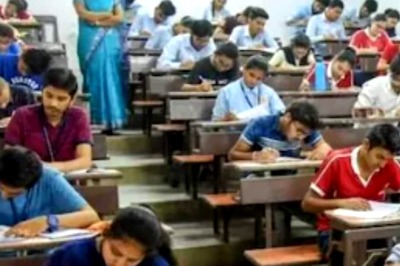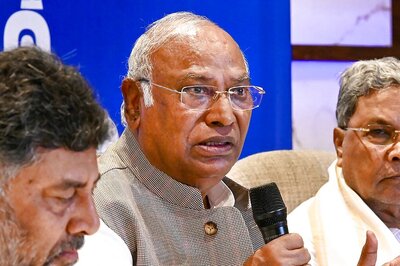
views
The world seems to have turned upside down since the Agnipath scheme for recruitments to the Indian military was unveiled last week by the Narendra Modi government.
Angry youth staged violent protests across the country against the scheme causing loss of at least two lives and public property, a Bharat Bandh was called on Monday leading to cancellation of over 500 trains, shutting of schools in some states and deployment of thousands of security personnel as a precautionary measure for any eventuality.
Some Armed Forces veterans took to the media to express their anguish over the scheme — many pointing out gaps in the scheme and its possible impact on the structure of the Indian military. Some prominent voices have also defended the scheme. Opposition parties united to launch attacks on it.
The government put forth service chiefs and fielded senior military officers twice to offer clarifications over the scheme and offered a host of explainers and myth busters to vehemently defend the scheme.
National Security Advisor Ajit Doval told ANI that training, discipline and an Army career will ensure that Agniveers have a high stature in the society. PM Narendra Modi told a crowd in Karnataka that the scheme will aid nation-building in the long run. The three service chiefs met PM Modi last evening.
Aside from the farmers’ protests on farm laws, rarely had any new policy move evoked such sharp and aggressive responses in the recent times. Perhaps, the architects of Agnipath did not foresee the scale of resistance that it was to face within a week of its announcement. A communication gap seemed the bane initially. But a rollback has been ruled out.
Three clear issues emerge here.
GIVING A CHOICE?
The first is can the aspirants, who want to make a career in the Army, Navy or the Indian Armed Forces, be given a choice keeping the regular route alive. If one goes by the government word, the scheme is a win-win for both sides. As many as 46,000 tech-savvy, military-trained, disciplined Agniveers will be ready to be released at the end of four years—a number set to grow progressively. Twenty-five per cent of them stand a chance to be hired back. The rest could be absorbed in jobs put out by the government, Central Armed Police Forces and private sector or opt for entrepreneurship or higher education.
For the military and the government, it will save the burgeoning defence pension budget and make the military “more youthful” by reducing the average age of the soldiers to 26.
But should the Agniveers be given an option by way of the scheme not being the only route for youth to join the military? Such an option is available for officers in the military. Those aspiring to join the Army, Navy and the IAF as officers can choose to join on a permanent commission and be eligible for pension, or as short service commission officers who retire without a pension after 10 or 14 years of service.
Why test-bed the scheme only on soldiers, airmen and sailors and not the officers in that case? That should be the ideal aim if the scheme will indeed weed out non-performers at the end of four years, make the defence forces more youthful and reduce defence pensions.
It is important to know the rationale behind testing a maiden scheme like Agnipath only to a certain group, for the onus of performance does not just rest on them.
WHY LEAVE OUT BUREAUCRACY?
Just a week ago, Prime Minister Modi announced his government’s plans to recruit 10 lakh personnel within 18 months. Why not recruit them too under an ‘Agnipath’ scheme where their jobs would be made permanent only after they prove their mettle in four years? This could act as a progressive reform to enforce performance-based service in India’s burgeoning bureaucratic class too.
At last count, India already has nearly 33 lakh central government servants.
CLARITY NEEDED ON SKILL CERTIFICATE
Thirdly, there needs to be more clarity on the Agniveer skill certificate which the Agniveers will receive when they are released four years after their service.
News18 earlier reported that a centralised digital database will be created by the three services on the Agniveers to track and keep a record of the skills they imbibe during their four-year tenure and the ministry of skill development and entrepreneurship is likely to be roped in to issue an elaborate skill-set certificate highlighting their competency.
The question here is — What is that skill certificate equivalent to?
The National Institute of Open Schooling is reportedly starting a programme to develop customised courses for Agniveers to get Class 12 certificates. They will apparently be recognised for higher education and employment, but what would be its relevance to those who join after completing their Class 12. Can it replace a graduation certificate?
Sure, the skill certificate will be recognised by potential employers but the government needs to throw more light on its equivalence to usual educational certification.
What would it mean for those joining from ITIs and after a diploma?
With no recruitments in the past two years, there will most likely a surge in aspirants this year wanting to join the military through the scheme. Agnipath success will, however, take more years to assess.
Read all the Latest News , Breaking News , watch Top Videos and Live TV here.



















Comments
0 comment